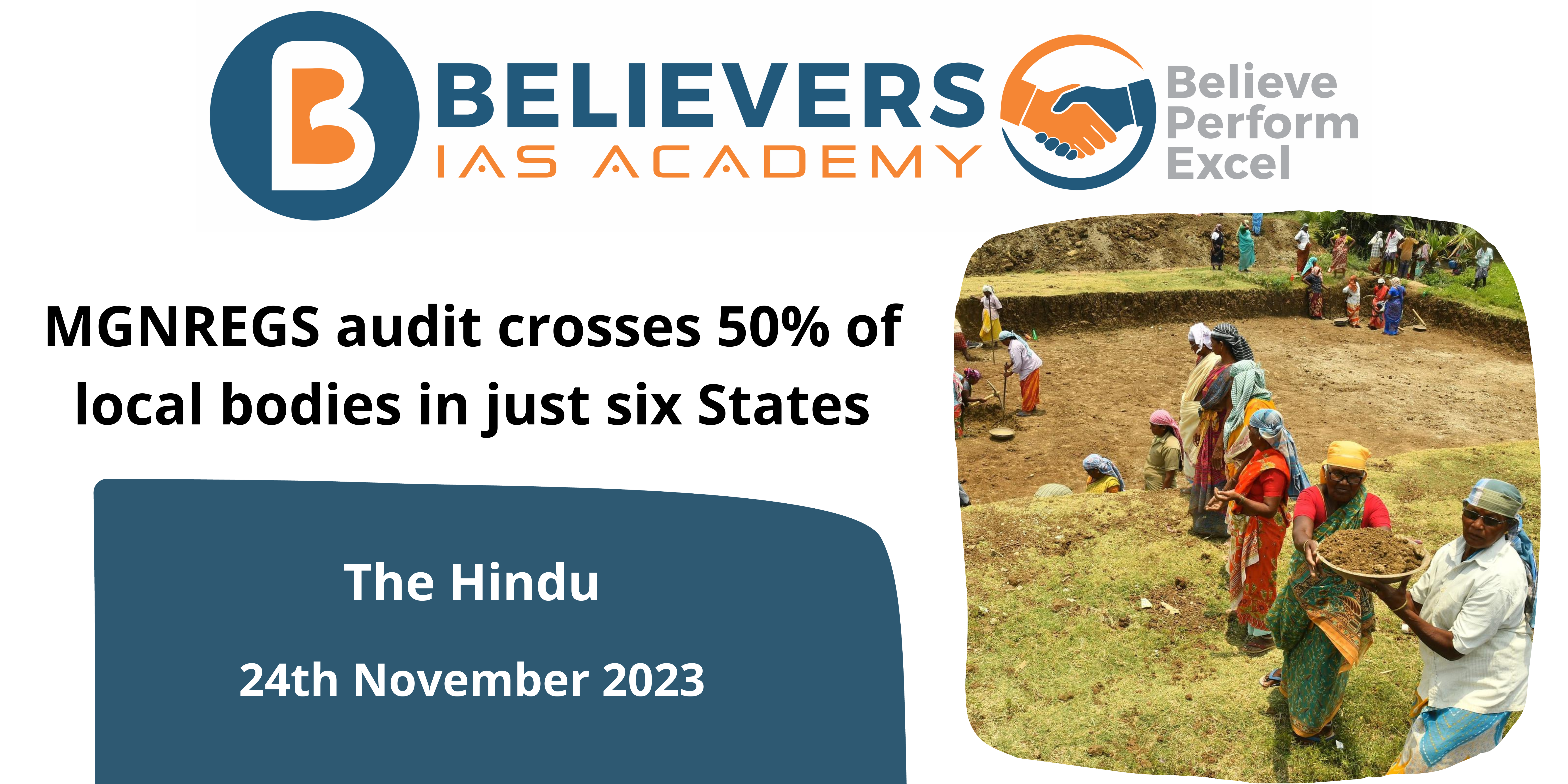MGNREGS audit crosses 50% of local bodies in just six States
Context
Only six of the 34 states and union territories have completed a social audit of work done under the Mahatma Gandhi National Rural Employment Guarantee Scheme (MGNREGS) in more than half of the gram panchayats. Kerala is the only state in which all gram panchayats are covered.
What is MGNREGS?
The Mahatma Gandhi National Rural Employment Guarantee Act of 2005, also referred to as the MGNREGA or NREGA(Former name), is a social welfare program in India that attempts to protect the “right to work.” The UPA government of Prime Minister Manmohan Singh passed this law on August 23, 2005, and it came into effect in February 2006 as a result of Minister for Rural Development Raghuvansh Prasad Singh’s parliamentary introduction of the bill.
What are the objectives of MGNREGA?
- ‘Right to Work Guarantee: The main goal of MGNREGA is to give every rural household with adult members who are willing to perform unskilled manual labour a legal guarantee of at least 100 days of paid employment in a fiscal year.
- Enhancing Livelihood Security: By giving households in rural areas regular and dependable job opportunities, MGNREGA hopes to improve the security of their means of subsistence.
- Building Durable Assets: The act intends to build durable assets through labour-intensive activity, helping to develop rural infrastructure and resources, such as roads, canals, ponds, and wells.
- Promoting Gender Equity: To empower rural women and advance gender equity, MGNREGA makes sure that one-third of the employment offered under the program is reserved for women.
- Reducing Rural-Urban movement: MGNREGA intends to lessen the distress-driven movement of rural residents to urban centres in pursuit of livelihoods by creating employment opportunities in rural areas.
- Environmental Protection: The act encourages practices that promote environmental preservation and sustainable development, such as water conservation, afforestation, and rural connectivity.
- Fostering Social equality: MGNREGA works to advance social equality by giving underprivileged and marginalized groups in society equal employment opportunities.
- Decentralized Implementation: The act promotes decentralization and community involvement by involving local self-government institutions (Panchayati Raj Institutions) in the scheme’s implementation.
- Ensuring Transparency and Accountability: The MGNREGA places a strong emphasis on transparency and accountability in the way it is implemented, using tools like social audits, community watchdogs, and record-keeping.
- Convergence with Other Programs: The legislation permits convergence with other development initiatives, guaranteeing that the MGNREGA’s efforts to create jobs do not compete with those of other programs.
What did the recent audit on MGNREGA tell us about the success of the programme?
- Coverage of Social Audits:
-
-
- Only six states and union territories have completed social audits in more than half of their gram panchayats.
- Kerala is the only state having complete coverage of gram panchayats.
-
- Anti-Corruption Mechanism:
-
-
- The Mahatma Gandhi National Rural Employment Guarantee Scheme (MGNREGS) includes a social audit as an anti-corruption instrument.
-
- Legislative Mandate:
-
-
- Section 17 of the MGNREGA requires gram sabhas to monitor task completion, emphasizing community involvement in overseeing the scheme’s implementation.
-
- Independent Social Audit Units:
-
-
- Each state has social audit units that operate independently of implementing authorities.
- These units are critical for conducting quality assurance checks on MGNREGA infrastructure as well as detecting cash theft and procedural irregularities.
-
- Auditing Principles:
-
-
- On December 19, 2016, the Comptroller and Auditor General announced auditing standards.
- Social Audit Units are entitled to funding equal to 0.5% of the previous year’s MGNREGA spending by the state.
-
- States Passing the 50% Mark:
-
-
- Apart from Kerala, states such as Bihar, Gujarat, Jammu & Kashmir, Odisha, and Uttar Pradesh have completed social audits in more than half of their gram panchayats.
-
- States having at least 40% coverage:
-
-
- Telangana, Himachal Pradesh, and Andhra Pradesh are said to have covered 40% of their villages or more.
-
- Low Turnout in Voting States:
-
- Social audit coverage is said to be inadequate in states that are now holding elections, including Madhya Pradesh, Mizoram, Chhattisgarh, and Rajasthan.
Why was Kerala able to achieve this successful audit?
- Kerala has a long tradition of active and engaged local government. The emphasis on decentralization and incorporating local communities in decision-making by the state may lead to effective social audits.
- The tradition in Kerala of holding periodic Social Audit Public Hearings at the panchayat level entails a close public review of audit results. This added level of transparency and responsibility may improve the efficacy of the social audit process.
- Kerala is well-known for having a high literacy rate and a well-educated populace. As a result, citizens may become more educated and engaged, facilitating the success of social audits through active participation.




